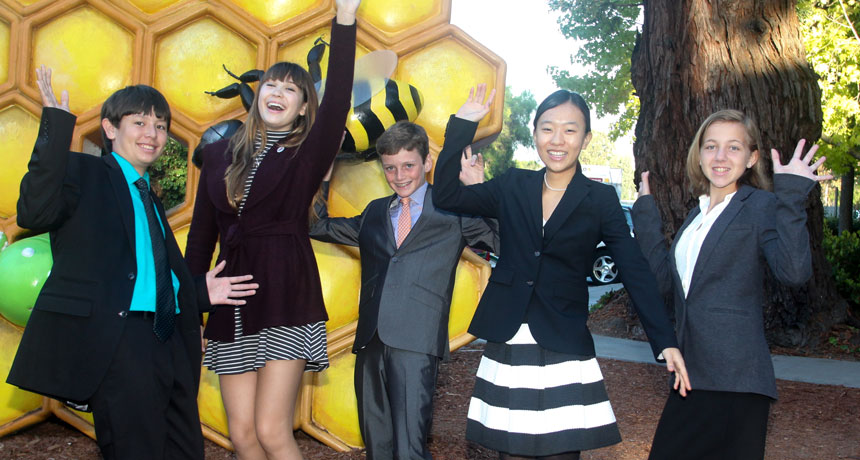My favorite field of science is…
Finalists at the Broadcom MASTERS competition tell Eureka! Lab what their favorite area of science is — and why

Students at the Broadcom MASTERS show off their spirit at the Google android garden.
L. Doane/SSP
SAN JOSE, Calif.— This week, 30 middle-school students and high-school freshmen met here for the 2015 competition known as Broadcom MASTERS (for Math, Applied Science, Technology and Engineering for Rising Stars). It is an annual competition where middle and early high school students share their winning middle-school science-fair projects and inventions with the public.
Broadcom MASTERS was created by Society for Science & the Public (which publishes this blog and Science News for Students). It is sponsored by Broadcom (a company that builds devices to connect to the Internet).
These MASTERS love science, technology, engineering and math. But they’ve all got their particular favorites. Here, in their own words, they share the STEM fields they like best.
My favorite kind of science is toxicology, because it helps study what kind of chemicals can affect humans. And it also helps to see what kind of medicines I can create to treat certain diseases.
– Carolyn Almonte, 12
My favorite kind of science is chemistry because I like to mix chemicals and see what will happen after they are mixed.
– Joseph Huitt, 13
My favorite kind of science is technology because it allows me to do anything in that field. Nothing is impossible.
– David Yue, 14
I love physics, because it has to do with so many things around us, and how they interact with other things around us.
– Avery Clowes, 13
My favorite kind of science is technology and programming. I think programming is magic in your fingers, you can make anything happen.
– Anish Singhani, 13
>
I like biology because it’s the study of life.
– Sriyaa Suresh, 13
My favorite kind of science is chemistry, because you get to learn about atoms. Atoms are what make up everything around you. Then you can understand why things are the way they are.
– Manasa Hari Bhimaraju, 11
My favorite kind of science is physics because there are so many interesting things you can do with physics, and there’s a wide variety of jobs.
– Mikayla Lindsay, 13
Follow Eureka! Lab on Twitter
Power Words
(for more about Power Words, click here)
atom The basic unit of a chemical element. Atoms are made up of a dense nucleus that contains positively charged protons and neutrally charged neutrons. The nucleus is orbited by a cloud of negatively charged electrons.
chemistry The field of science that deals with the composition, structure and properties of substances and how they interact with one another. Chemists use this knowledge to study unfamiliar substances, to reproduce large quantities of useful substances or to design and create new and useful substances. (about compounds) The term is used to refer to the recipe of a compound, the way it’s produced or some of its properties.
programming (in computing) To use a computer language to write or revise a set of instructions that makes a computer do something. The set of instructions that does this is known as a computer program.
technology The application of scientific knowledge for practical purposes, especially in industry — or the devices, processes and systems that result from those efforts.
toxicology The branch of science that probes poisons and how they disrupt the health of people and other organisms. Scientists who work in this field are called toxicologists.